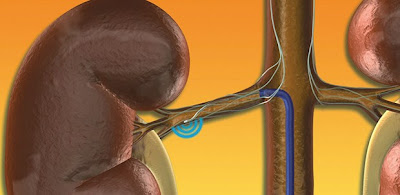
How can successfully treat resistant hypertension?
In a considerable number of hypertension patients can not be well controlled or with three or more drugs. Today we have a new option for these cases: renal sympathectomy intervention.
pathophysiological concept which states that blood pressure is the result of an overactive sympathetic nervous system is not new.
From the 50's practice of sympathectomy surgery as a last resort in malignant hypertension (resistant to conventional treatment). As aggressive operation is not at all surprising that this form of treatment has not ever come to impose itself as a real alternative.
Thanks to modern technology via a catheter is now possible that this approach to long-term therapy. This is a modified and much less aggressive treatment of hypertension. The goal of treatment is made up of nerve fibers of the sympathetic nervous system involving the renal arteries and penetrate the adventitia.
We know that renal nerve fibers largely determine the overall activity of the sympathetic nervous system and renal denervation of the sympathetic system is a new effective procedure for treatment of resistant hypertension or malignant.
This new method of bilateral denervation of the renal artery was performed by radiofrequency ablation is performed through an endovascular catheter. The procedure is not complicated in its implementation, lasts 40 to 60 minutes. Patients receive only a local anesthetic and analgesic.
A randomized study conducted by the team Dr. Michael Böhm in Homburg / Saar (Germany) and published recently, have shown positive results of this technique and its effectiveness in the treatment of malignant hypertension.
Dr. Mahfoud, a contributor to this team, said at the congress in Mannheim of the German Society of Cardiology, the patients selected for this study were taking an average of five to six different drugs for high blood pressure and nevertheless still had elevated blood pressure values.
Compared with the control group, which on average no significant changes in group selective renal sympathectomy, six months after surgical treatment was able to observe a significant reduction in blood pressure, with an average of 33/10 mmHg.
both measurements of blood pressure at home as their 24-hour ambulatory monitoring, we were able to demonstrate a significant reduction in blood pressure. After ablation, 84% of patients had a reduction in systolic blood pressure of at least 10 mm Hg in the control group only produced a reduction of blood pressure in 34% of patients.
denervation renal sympathetic also had a favorable effect on glucose metabolism, said Dr. Mahfoud. There was a significant reduction in blood glucose (fasting 118mg/dl average, it fell to 108 mg / dl) and improved insulin sensitivity.
Via: Aerztezeitung.de
0 comments:
Post a Comment